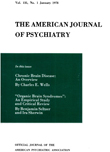Abstract
On the basis of these interviews with a group of psychiatrists which can be considered, we believe, as representative of such specialists in private practice, it appears that the psychotherapeutic side of practice is mainly empirical and consists largely of suggestion and the transmission to the patient of the psychiatrist's wisdom, gained from wide professional experience with many people. While it is difficult to determine the exact content of psychotherapy from interviews such as these, it does appear that psychodynamic theories, though widely popular, are in practice difficult to apply as specifically as the psychiatrist would like.
There appears to exist a not inconsiderable amount of doubt and confusion among these psychiatrists about the exact nature of the ills they are called upon to treat and about the clinical usefulness of their theoretical formulations and of the various therapeutic measures available to them. This confusion is evident from statements made in the interviews and by some of the practices described. Thus, nearly all these psychiatrists use drugs with definite success in treating mental illness, especially the more severely incapacitating types, yet they say, at the same time, that these illnesses are basically psychological and psychotherapy is the fundamental treatment. They assume that psychotherapy is the treatment of choice, yet they express a wish to know how effective psychotherapy is and how it can be evaluated. They would like to know more about "what goes on in the patient" during psychotherapy, but no one expressed a wish to know how the drugs work which are helpful in relieving many psychiatric symptoms, often dramatically and for long periods of time. There was no feeling that these newer drugs are a mere "flash in the pan" but there was no indication that the efficacy of the drugs suggested to the psychiatrists any implications about the nature of the psychiatric disorders under discussion.
This investigation, then, informal and limited in scope as it was, shows fairly clearly that the relation between a psychiatrist's theory and his actual use of various therapeutic methods is not so simple and scientifically justifiable as one could wish. These psychiatrists find that clinical necessity often leads them to use methods which their theory says should be unnecessary and indeed should not be successful. They find, furthermore, that the therapeutic method their theory says is fundamental and should be most effective cannot usually be applied with any specificity and often may be a failure. They find that they do not for the most part know just how or why they help their patients, and yet help them they do.
It has been said that psychiatry has entered the "take-off" phase of development, during the past 10 years, and we can hope that the extraordinary rate of progress of the "take-off" will continue. It is encouraging to learn that this progress is seen not only in research reports but in the everyday work of the practicing psychiatrist. Whatever the lag between theory and practice, and whatever confusion this lag may engender in the minds of those who must deal with the sick patient, the psychiatrist has shown himself in this study to be in the best tradition of the medical practitioner who, to quote Dr. Alfred Stillé, must never forget that "it is still no small portion of his art to rid his patient's path of thorns if he cannot make it blossom with roses."

